Stereotyping and healthcare decisions about People living with learning disabilities
VerifiedAdded on 2023/06/18
|12
|3628
|185
AI Summary
This essay discusses the impact of stereotyping on people living with learning disabilities, strategies to promote inclusivity, and government policies. It also provides background information on learning disabilities and common stereotypes associated with it. The essay reflects on self-awareness and resilience as well.
Contribute Materials
Your contribution can guide someone’s learning journey. Share your
documents today.
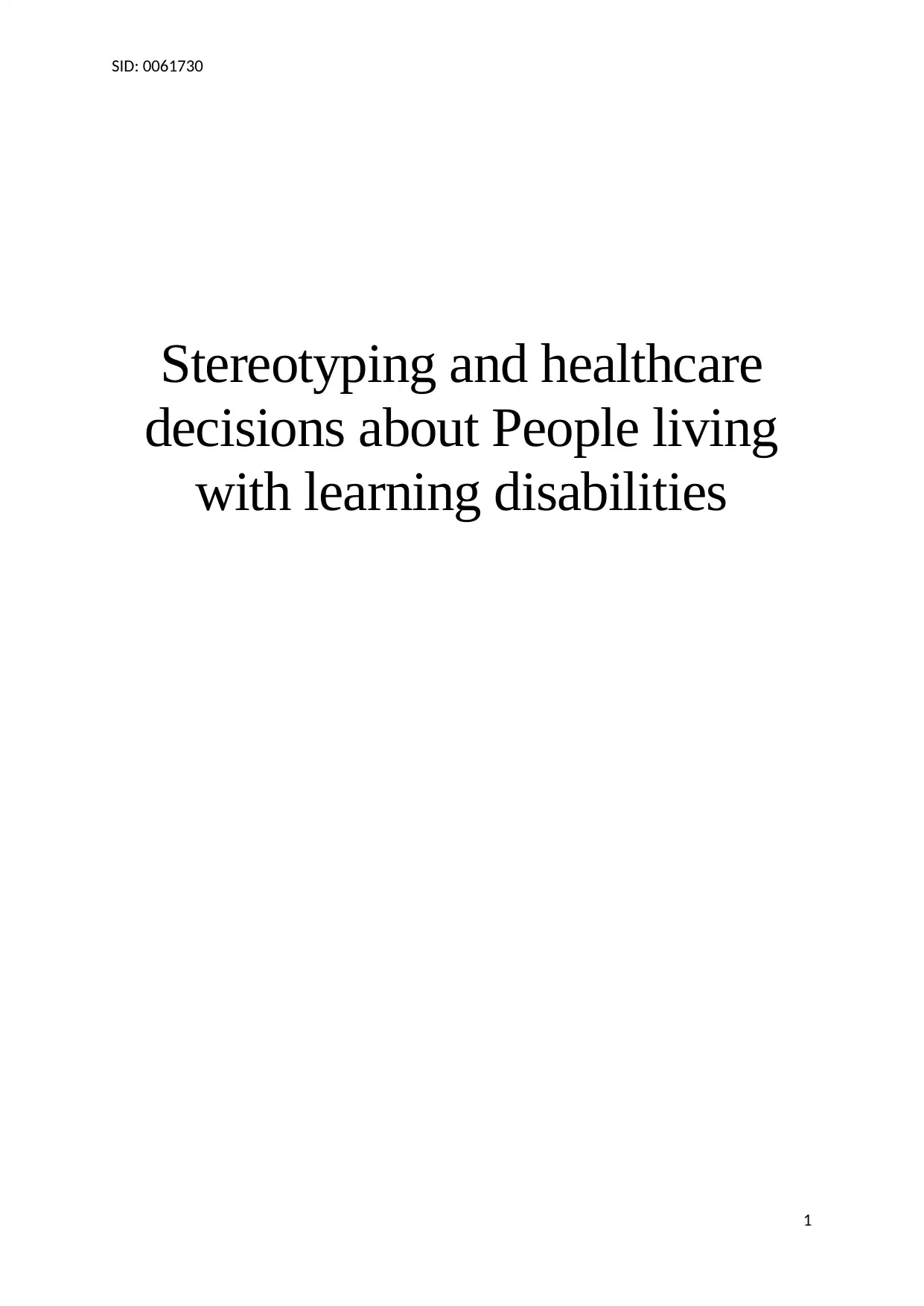
SID: 0061730
Stereotyping and healthcare
decisions about People living
with learning disabilities
1
Stereotyping and healthcare
decisions about People living
with learning disabilities
1
Secure Best Marks with AI Grader
Need help grading? Try our AI Grader for instant feedback on your assignments.
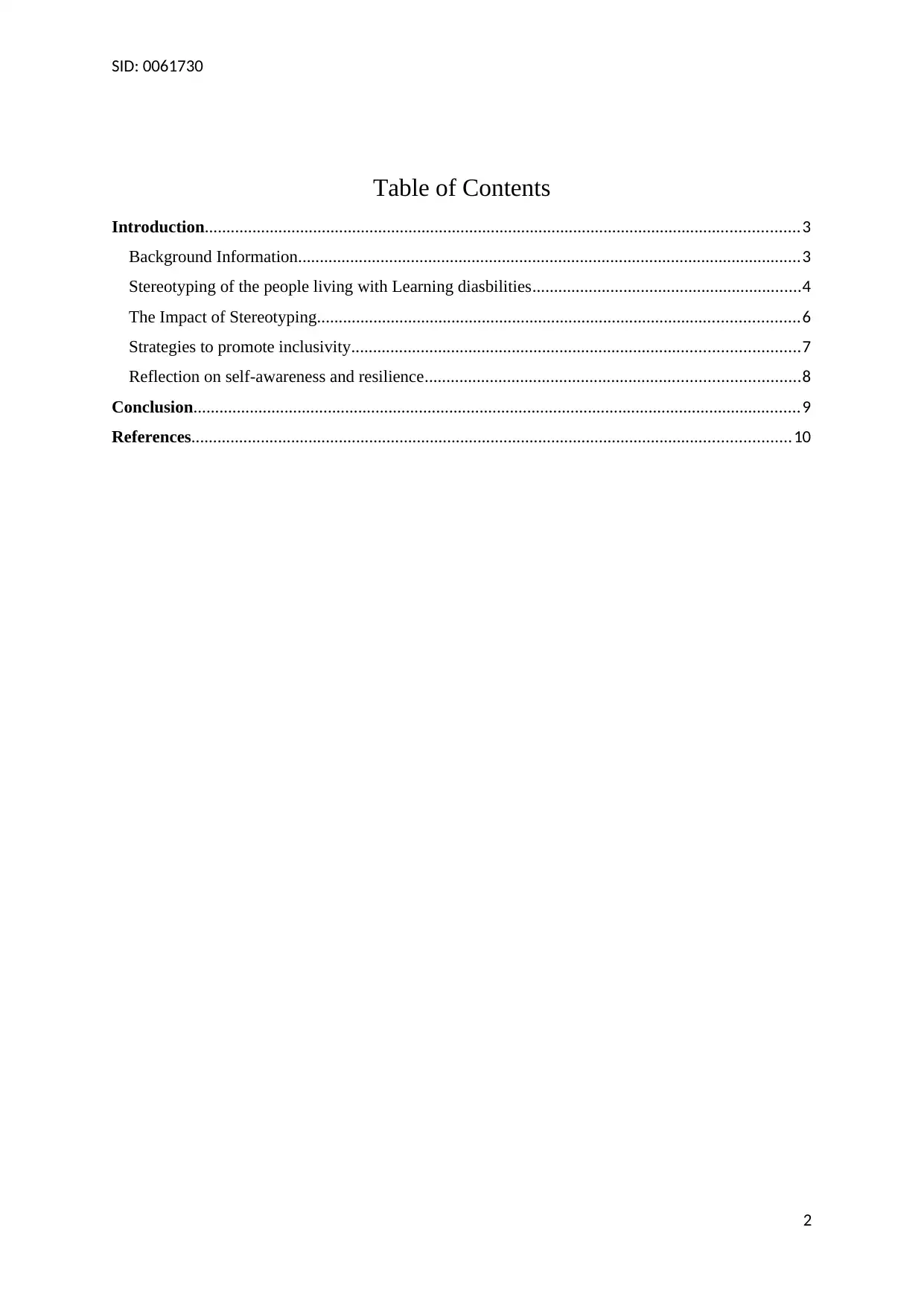
SID: 0061730
Table of Contents
Introduction.........................................................................................................................................3
Background Information....................................................................................................................3
Stereotyping of the people living with Learning diasbilities..............................................................4
The Impact of Stereotyping...............................................................................................................6
Strategies to promote inclusivity.......................................................................................................7
Reflection on self-awareness and resilience......................................................................................8
Conclusion............................................................................................................................................9
References..........................................................................................................................................10
2
Table of Contents
Introduction.........................................................................................................................................3
Background Information....................................................................................................................3
Stereotyping of the people living with Learning diasbilities..............................................................4
The Impact of Stereotyping...............................................................................................................6
Strategies to promote inclusivity.......................................................................................................7
Reflection on self-awareness and resilience......................................................................................8
Conclusion............................................................................................................................................9
References..........................................................................................................................................10
2
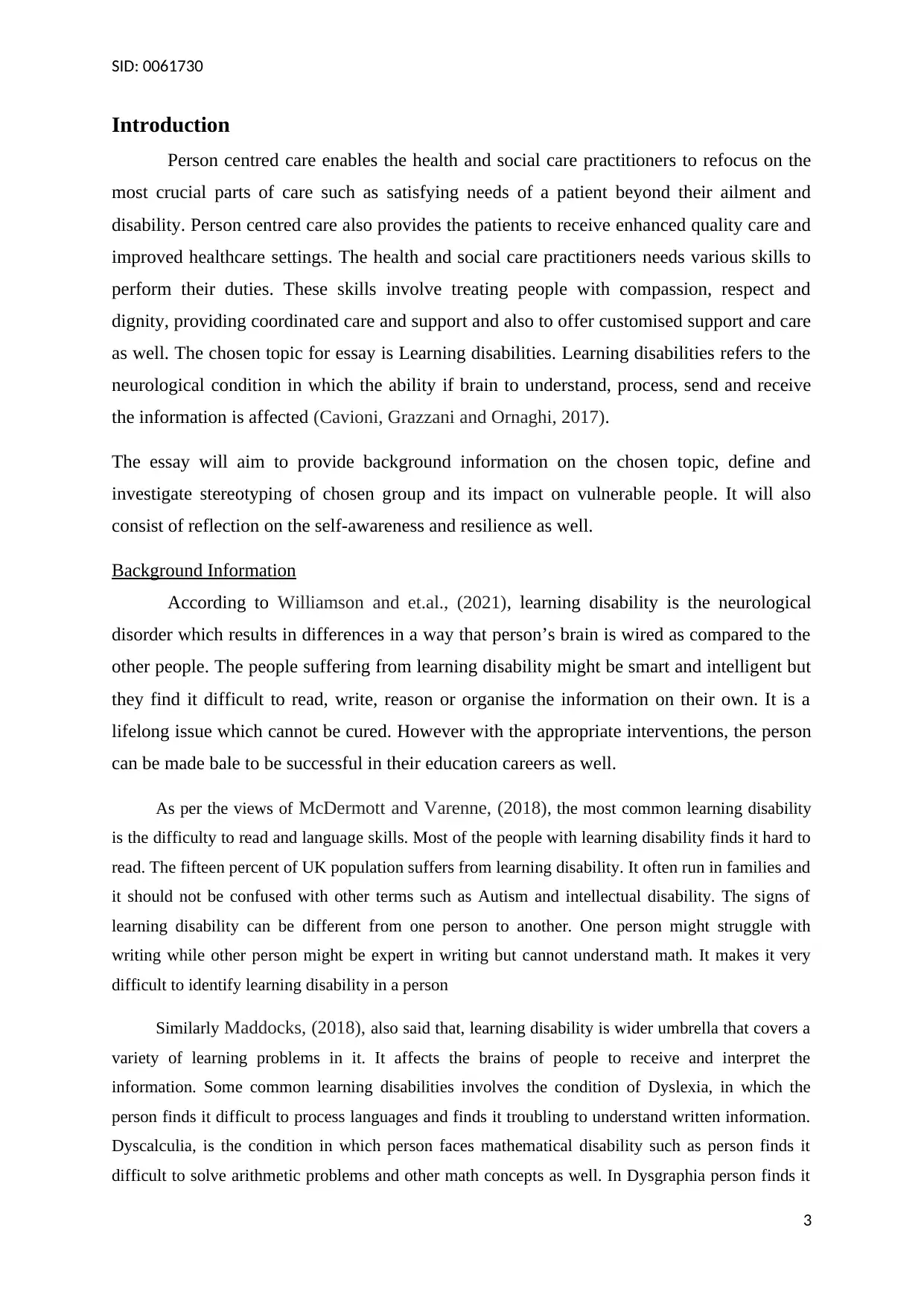
SID: 0061730
Introduction
Person centred care enables the health and social care practitioners to refocus on the
most crucial parts of care such as satisfying needs of a patient beyond their ailment and
disability. Person centred care also provides the patients to receive enhanced quality care and
improved healthcare settings. The health and social care practitioners needs various skills to
perform their duties. These skills involve treating people with compassion, respect and
dignity, providing coordinated care and support and also to offer customised support and care
as well. The chosen topic for essay is Learning disabilities. Learning disabilities refers to the
neurological condition in which the ability if brain to understand, process, send and receive
the information is affected (Cavioni, Grazzani and Ornaghi, 2017).
The essay will aim to provide background information on the chosen topic, define and
investigate stereotyping of chosen group and its impact on vulnerable people. It will also
consist of reflection on the self-awareness and resilience as well.
Background Information
According to Williamson and et.al., (2021), learning disability is the neurological
disorder which results in differences in a way that person’s brain is wired as compared to the
other people. The people suffering from learning disability might be smart and intelligent but
they find it difficult to read, write, reason or organise the information on their own. It is a
lifelong issue which cannot be cured. However with the appropriate interventions, the person
can be made bale to be successful in their education careers as well.
As per the views of McDermott and Varenne, (2018), the most common learning disability
is the difficulty to read and language skills. Most of the people with learning disability finds it hard to
read. The fifteen percent of UK population suffers from learning disability. It often run in families and
it should not be confused with other terms such as Autism and intellectual disability. The signs of
learning disability can be different from one person to another. One person might struggle with
writing while other person might be expert in writing but cannot understand math. It makes it very
difficult to identify learning disability in a person
Similarly Maddocks, (2018), also said that, learning disability is wider umbrella that covers a
variety of learning problems in it. It affects the brains of people to receive and interpret the
information. Some common learning disabilities involves the condition of Dyslexia, in which the
person finds it difficult to process languages and finds it troubling to understand written information.
Dyscalculia, is the condition in which person faces mathematical disability such as person finds it
difficult to solve arithmetic problems and other math concepts as well. In Dysgraphia person finds it
3
Introduction
Person centred care enables the health and social care practitioners to refocus on the
most crucial parts of care such as satisfying needs of a patient beyond their ailment and
disability. Person centred care also provides the patients to receive enhanced quality care and
improved healthcare settings. The health and social care practitioners needs various skills to
perform their duties. These skills involve treating people with compassion, respect and
dignity, providing coordinated care and support and also to offer customised support and care
as well. The chosen topic for essay is Learning disabilities. Learning disabilities refers to the
neurological condition in which the ability if brain to understand, process, send and receive
the information is affected (Cavioni, Grazzani and Ornaghi, 2017).
The essay will aim to provide background information on the chosen topic, define and
investigate stereotyping of chosen group and its impact on vulnerable people. It will also
consist of reflection on the self-awareness and resilience as well.
Background Information
According to Williamson and et.al., (2021), learning disability is the neurological
disorder which results in differences in a way that person’s brain is wired as compared to the
other people. The people suffering from learning disability might be smart and intelligent but
they find it difficult to read, write, reason or organise the information on their own. It is a
lifelong issue which cannot be cured. However with the appropriate interventions, the person
can be made bale to be successful in their education careers as well.
As per the views of McDermott and Varenne, (2018), the most common learning disability
is the difficulty to read and language skills. Most of the people with learning disability finds it hard to
read. The fifteen percent of UK population suffers from learning disability. It often run in families and
it should not be confused with other terms such as Autism and intellectual disability. The signs of
learning disability can be different from one person to another. One person might struggle with
writing while other person might be expert in writing but cannot understand math. It makes it very
difficult to identify learning disability in a person
Similarly Maddocks, (2018), also said that, learning disability is wider umbrella that covers a
variety of learning problems in it. It affects the brains of people to receive and interpret the
information. Some common learning disabilities involves the condition of Dyslexia, in which the
person finds it difficult to process languages and finds it troubling to understand written information.
Dyscalculia, is the condition in which person faces mathematical disability such as person finds it
difficult to solve arithmetic problems and other math concepts as well. In Dysgraphia person finds it
3
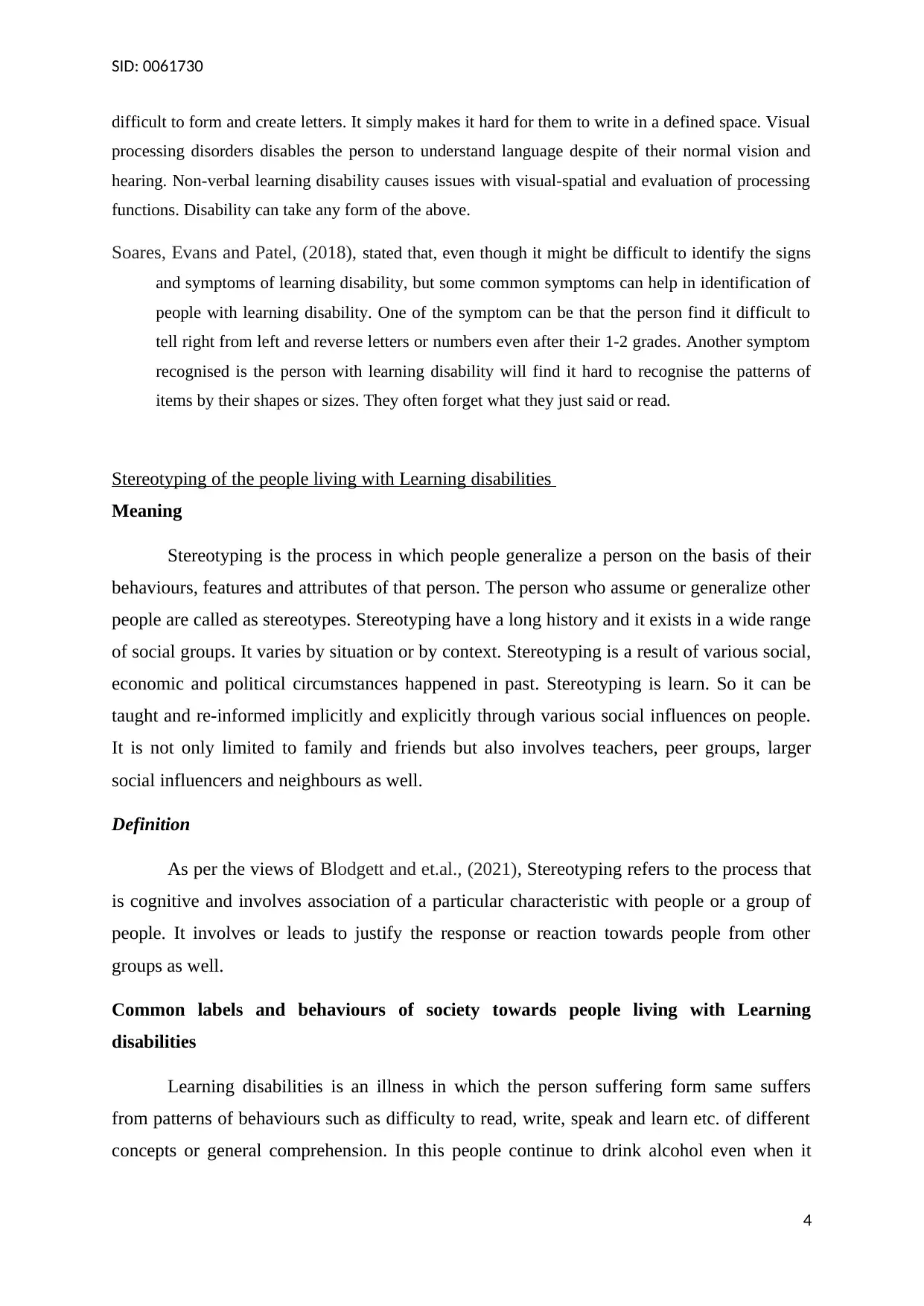
SID: 0061730
difficult to form and create letters. It simply makes it hard for them to write in a defined space. Visual
processing disorders disables the person to understand language despite of their normal vision and
hearing. Non-verbal learning disability causes issues with visual-spatial and evaluation of processing
functions. Disability can take any form of the above.
Soares, Evans and Patel, (2018), stated that, even though it might be difficult to identify the signs
and symptoms of learning disability, but some common symptoms can help in identification of
people with learning disability. One of the symptom can be that the person find it difficult to
tell right from left and reverse letters or numbers even after their 1-2 grades. Another symptom
recognised is the person with learning disability will find it hard to recognise the patterns of
items by their shapes or sizes. They often forget what they just said or read.
Stereotyping of the people living with Learning disabilities
Meaning
Stereotyping is the process in which people generalize a person on the basis of their
behaviours, features and attributes of that person. The person who assume or generalize other
people are called as stereotypes. Stereotyping have a long history and it exists in a wide range
of social groups. It varies by situation or by context. Stereotyping is a result of various social,
economic and political circumstances happened in past. Stereotyping is learn. So it can be
taught and re-informed implicitly and explicitly through various social influences on people.
It is not only limited to family and friends but also involves teachers, peer groups, larger
social influencers and neighbours as well.
Definition
As per the views of Blodgett and et.al., (2021), Stereotyping refers to the process that
is cognitive and involves association of a particular characteristic with people or a group of
people. It involves or leads to justify the response or reaction towards people from other
groups as well.
Common labels and behaviours of society towards people living with Learning
disabilities
Learning disabilities is an illness in which the person suffering form same suffers
from patterns of behaviours such as difficulty to read, write, speak and learn etc. of different
concepts or general comprehension. In this people continue to drink alcohol even when it
4
difficult to form and create letters. It simply makes it hard for them to write in a defined space. Visual
processing disorders disables the person to understand language despite of their normal vision and
hearing. Non-verbal learning disability causes issues with visual-spatial and evaluation of processing
functions. Disability can take any form of the above.
Soares, Evans and Patel, (2018), stated that, even though it might be difficult to identify the signs
and symptoms of learning disability, but some common symptoms can help in identification of
people with learning disability. One of the symptom can be that the person find it difficult to
tell right from left and reverse letters or numbers even after their 1-2 grades. Another symptom
recognised is the person with learning disability will find it hard to recognise the patterns of
items by their shapes or sizes. They often forget what they just said or read.
Stereotyping of the people living with Learning disabilities
Meaning
Stereotyping is the process in which people generalize a person on the basis of their
behaviours, features and attributes of that person. The person who assume or generalize other
people are called as stereotypes. Stereotyping have a long history and it exists in a wide range
of social groups. It varies by situation or by context. Stereotyping is a result of various social,
economic and political circumstances happened in past. Stereotyping is learn. So it can be
taught and re-informed implicitly and explicitly through various social influences on people.
It is not only limited to family and friends but also involves teachers, peer groups, larger
social influencers and neighbours as well.
Definition
As per the views of Blodgett and et.al., (2021), Stereotyping refers to the process that
is cognitive and involves association of a particular characteristic with people or a group of
people. It involves or leads to justify the response or reaction towards people from other
groups as well.
Common labels and behaviours of society towards people living with Learning
disabilities
Learning disabilities is an illness in which the person suffering form same suffers
from patterns of behaviours such as difficulty to read, write, speak and learn etc. of different
concepts or general comprehension. In this people continue to drink alcohol even when it
4
Secure Best Marks with AI Grader
Need help grading? Try our AI Grader for instant feedback on your assignments.
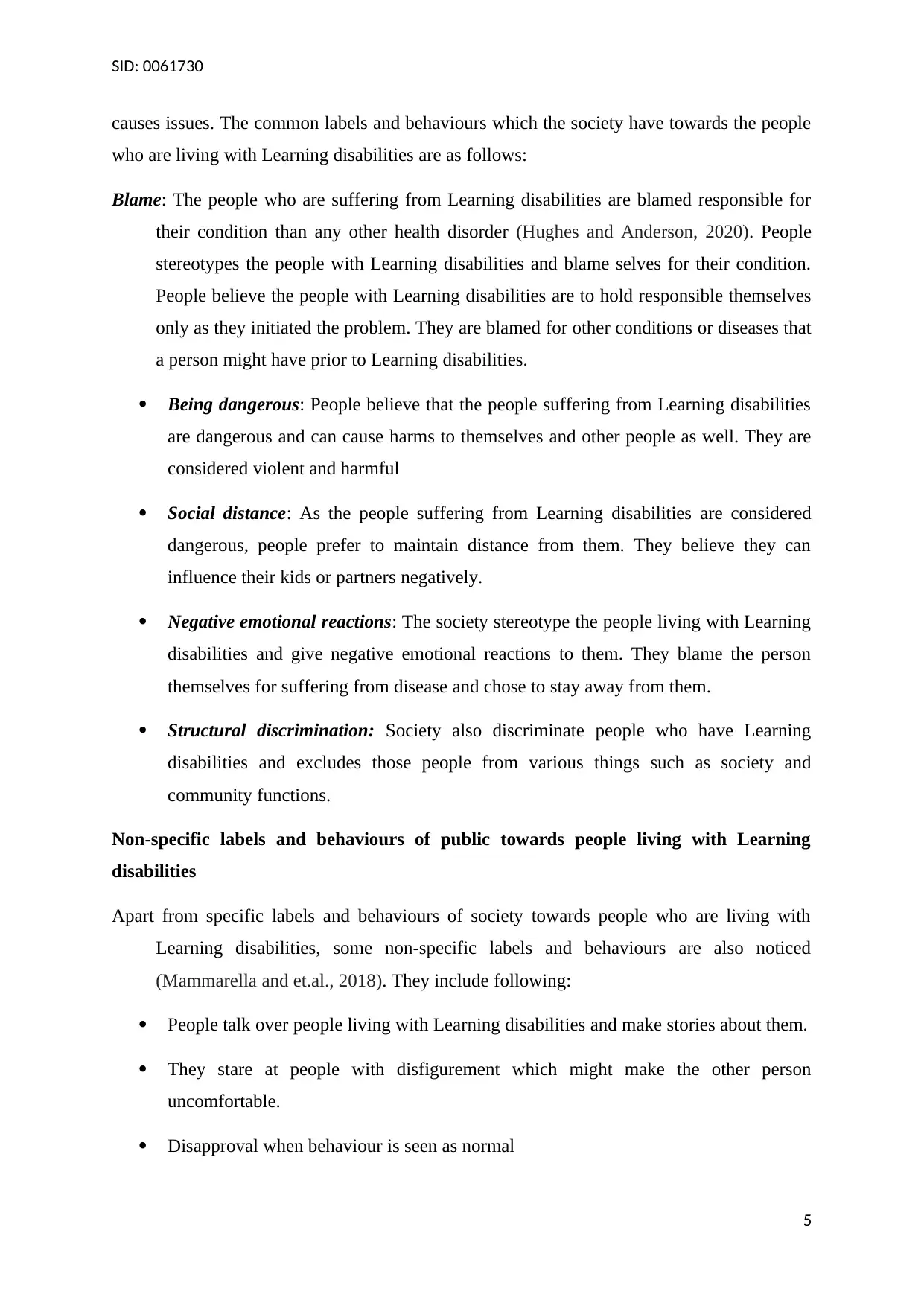
SID: 0061730
causes issues. The common labels and behaviours which the society have towards the people
who are living with Learning disabilities are as follows:
Blame: The people who are suffering from Learning disabilities are blamed responsible for
their condition than any other health disorder (Hughes and Anderson, 2020). People
stereotypes the people with Learning disabilities and blame selves for their condition.
People believe the people with Learning disabilities are to hold responsible themselves
only as they initiated the problem. They are blamed for other conditions or diseases that
a person might have prior to Learning disabilities.
Being dangerous: People believe that the people suffering from Learning disabilities
are dangerous and can cause harms to themselves and other people as well. They are
considered violent and harmful
Social distance: As the people suffering from Learning disabilities are considered
dangerous, people prefer to maintain distance from them. They believe they can
influence their kids or partners negatively.
Negative emotional reactions: The society stereotype the people living with Learning
disabilities and give negative emotional reactions to them. They blame the person
themselves for suffering from disease and chose to stay away from them.
Structural discrimination: Society also discriminate people who have Learning
disabilities and excludes those people from various things such as society and
community functions.
Non-specific labels and behaviours of public towards people living with Learning
disabilities
Apart from specific labels and behaviours of society towards people who are living with
Learning disabilities, some non-specific labels and behaviours are also noticed
(Mammarella and et.al., 2018). They include following:
People talk over people living with Learning disabilities and make stories about them.
They stare at people with disfigurement which might make the other person
uncomfortable.
Disapproval when behaviour is seen as normal
5
causes issues. The common labels and behaviours which the society have towards the people
who are living with Learning disabilities are as follows:
Blame: The people who are suffering from Learning disabilities are blamed responsible for
their condition than any other health disorder (Hughes and Anderson, 2020). People
stereotypes the people with Learning disabilities and blame selves for their condition.
People believe the people with Learning disabilities are to hold responsible themselves
only as they initiated the problem. They are blamed for other conditions or diseases that
a person might have prior to Learning disabilities.
Being dangerous: People believe that the people suffering from Learning disabilities
are dangerous and can cause harms to themselves and other people as well. They are
considered violent and harmful
Social distance: As the people suffering from Learning disabilities are considered
dangerous, people prefer to maintain distance from them. They believe they can
influence their kids or partners negatively.
Negative emotional reactions: The society stereotype the people living with Learning
disabilities and give negative emotional reactions to them. They blame the person
themselves for suffering from disease and chose to stay away from them.
Structural discrimination: Society also discriminate people who have Learning
disabilities and excludes those people from various things such as society and
community functions.
Non-specific labels and behaviours of public towards people living with Learning
disabilities
Apart from specific labels and behaviours of society towards people who are living with
Learning disabilities, some non-specific labels and behaviours are also noticed
(Mammarella and et.al., 2018). They include following:
People talk over people living with Learning disabilities and make stories about them.
They stare at people with disfigurement which might make the other person
uncomfortable.
Disapproval when behaviour is seen as normal
5
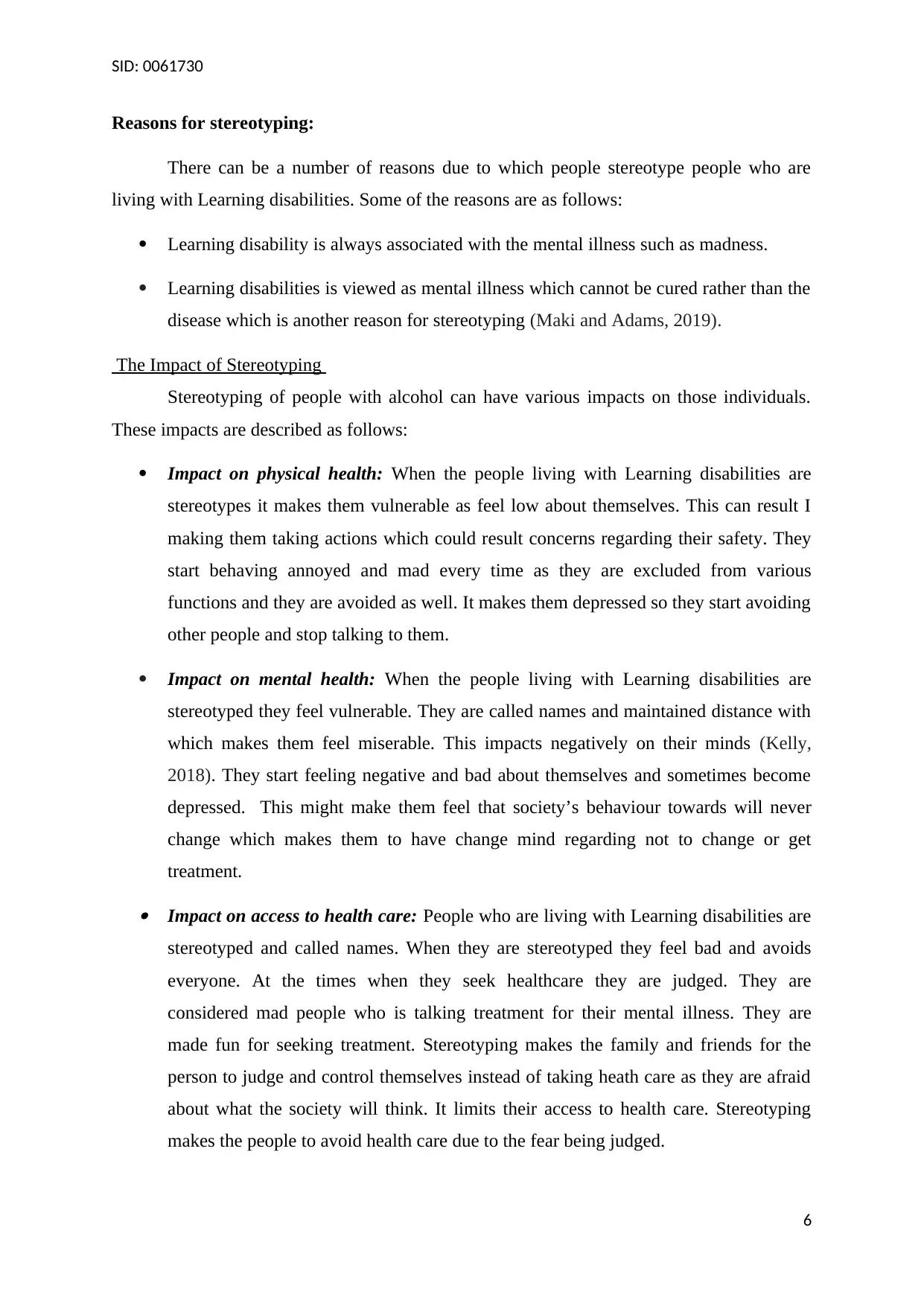
SID: 0061730
Reasons for stereotyping:
There can be a number of reasons due to which people stereotype people who are
living with Learning disabilities. Some of the reasons are as follows:
Learning disability is always associated with the mental illness such as madness.
Learning disabilities is viewed as mental illness which cannot be cured rather than the
disease which is another reason for stereotyping (Maki and Adams, 2019).
The Impact of Stereotyping
Stereotyping of people with alcohol can have various impacts on those individuals.
These impacts are described as follows:
Impact on physical health: When the people living with Learning disabilities are
stereotypes it makes them vulnerable as feel low about themselves. This can result I
making them taking actions which could result concerns regarding their safety. They
start behaving annoyed and mad every time as they are excluded from various
functions and they are avoided as well. It makes them depressed so they start avoiding
other people and stop talking to them.
Impact on mental health: When the people living with Learning disabilities are
stereotyped they feel vulnerable. They are called names and maintained distance with
which makes them feel miserable. This impacts negatively on their minds (Kelly,
2018). They start feeling negative and bad about themselves and sometimes become
depressed. This might make them feel that society’s behaviour towards will never
change which makes them to have change mind regarding not to change or get
treatment. Impact on access to health care: People who are living with Learning disabilities are
stereotyped and called names. When they are stereotyped they feel bad and avoids
everyone. At the times when they seek healthcare they are judged. They are
considered mad people who is talking treatment for their mental illness. They are
made fun for seeking treatment. Stereotyping makes the family and friends for the
person to judge and control themselves instead of taking heath care as they are afraid
about what the society will think. It limits their access to health care. Stereotyping
makes the people to avoid health care due to the fear being judged.
6
Reasons for stereotyping:
There can be a number of reasons due to which people stereotype people who are
living with Learning disabilities. Some of the reasons are as follows:
Learning disability is always associated with the mental illness such as madness.
Learning disabilities is viewed as mental illness which cannot be cured rather than the
disease which is another reason for stereotyping (Maki and Adams, 2019).
The Impact of Stereotyping
Stereotyping of people with alcohol can have various impacts on those individuals.
These impacts are described as follows:
Impact on physical health: When the people living with Learning disabilities are
stereotypes it makes them vulnerable as feel low about themselves. This can result I
making them taking actions which could result concerns regarding their safety. They
start behaving annoyed and mad every time as they are excluded from various
functions and they are avoided as well. It makes them depressed so they start avoiding
other people and stop talking to them.
Impact on mental health: When the people living with Learning disabilities are
stereotyped they feel vulnerable. They are called names and maintained distance with
which makes them feel miserable. This impacts negatively on their minds (Kelly,
2018). They start feeling negative and bad about themselves and sometimes become
depressed. This might make them feel that society’s behaviour towards will never
change which makes them to have change mind regarding not to change or get
treatment. Impact on access to health care: People who are living with Learning disabilities are
stereotyped and called names. When they are stereotyped they feel bad and avoids
everyone. At the times when they seek healthcare they are judged. They are
considered mad people who is talking treatment for their mental illness. They are
made fun for seeking treatment. Stereotyping makes the family and friends for the
person to judge and control themselves instead of taking heath care as they are afraid
about what the society will think. It limits their access to health care. Stereotyping
makes the people to avoid health care due to the fear being judged.
6
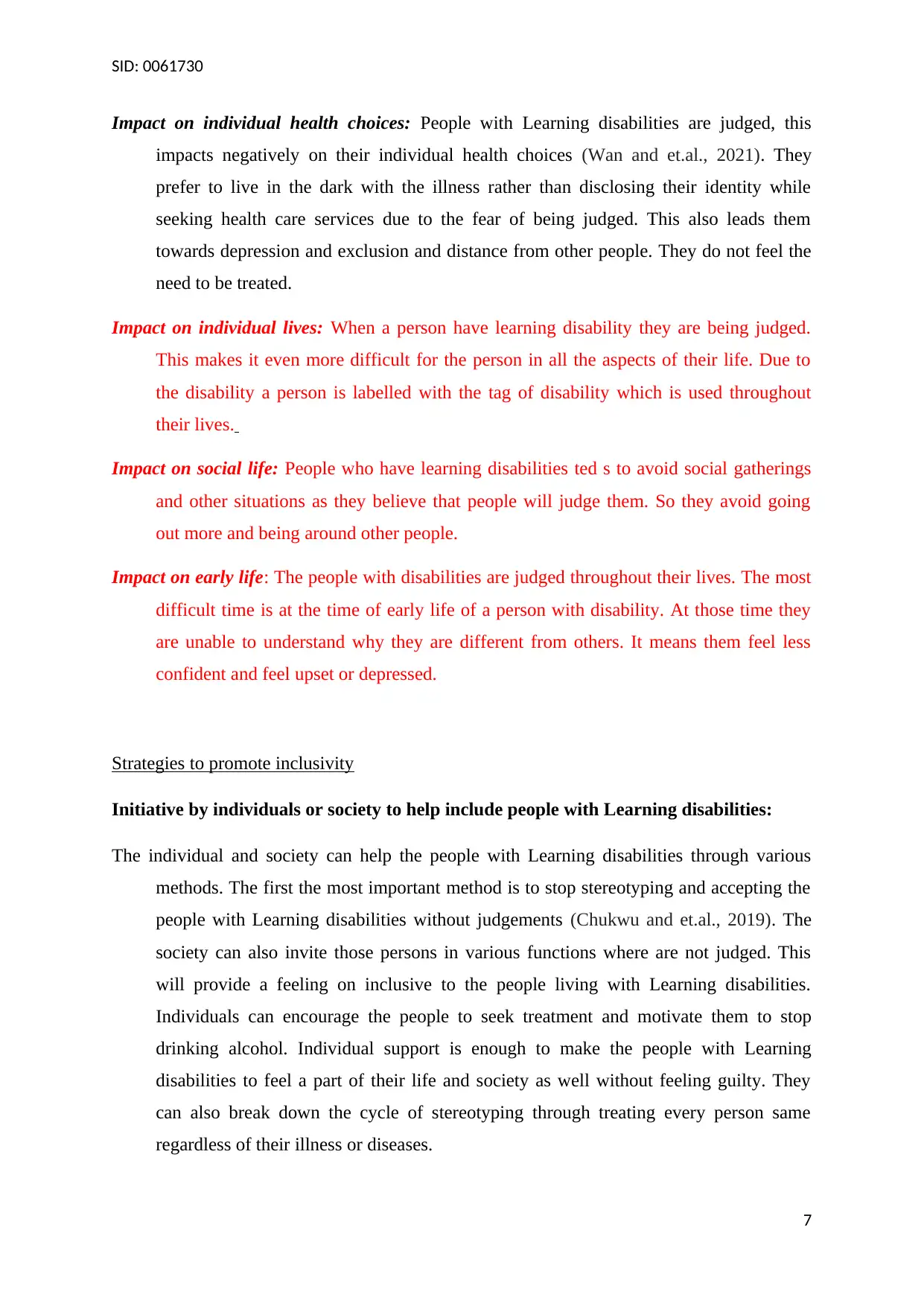
SID: 0061730
Impact on individual health choices: People with Learning disabilities are judged, this
impacts negatively on their individual health choices (Wan and et.al., 2021). They
prefer to live in the dark with the illness rather than disclosing their identity while
seeking health care services due to the fear of being judged. This also leads them
towards depression and exclusion and distance from other people. They do not feel the
need to be treated.
Impact on individual lives: When a person have learning disability they are being judged.
This makes it even more difficult for the person in all the aspects of their life. Due to
the disability a person is labelled with the tag of disability which is used throughout
their lives.
Impact on social life: People who have learning disabilities ted s to avoid social gatherings
and other situations as they believe that people will judge them. So they avoid going
out more and being around other people.
Impact on early life: The people with disabilities are judged throughout their lives. The most
difficult time is at the time of early life of a person with disability. At those time they
are unable to understand why they are different from others. It means them feel less
confident and feel upset or depressed.
Strategies to promote inclusivity
Initiative by individuals or society to help include people with Learning disabilities:
The individual and society can help the people with Learning disabilities through various
methods. The first the most important method is to stop stereotyping and accepting the
people with Learning disabilities without judgements (Chukwu and et.al., 2019). The
society can also invite those persons in various functions where are not judged. This
will provide a feeling on inclusive to the people living with Learning disabilities.
Individuals can encourage the people to seek treatment and motivate them to stop
drinking alcohol. Individual support is enough to make the people with Learning
disabilities to feel a part of their life and society as well without feeling guilty. They
can also break down the cycle of stereotyping through treating every person same
regardless of their illness or diseases.
7
Impact on individual health choices: People with Learning disabilities are judged, this
impacts negatively on their individual health choices (Wan and et.al., 2021). They
prefer to live in the dark with the illness rather than disclosing their identity while
seeking health care services due to the fear of being judged. This also leads them
towards depression and exclusion and distance from other people. They do not feel the
need to be treated.
Impact on individual lives: When a person have learning disability they are being judged.
This makes it even more difficult for the person in all the aspects of their life. Due to
the disability a person is labelled with the tag of disability which is used throughout
their lives.
Impact on social life: People who have learning disabilities ted s to avoid social gatherings
and other situations as they believe that people will judge them. So they avoid going
out more and being around other people.
Impact on early life: The people with disabilities are judged throughout their lives. The most
difficult time is at the time of early life of a person with disability. At those time they
are unable to understand why they are different from others. It means them feel less
confident and feel upset or depressed.
Strategies to promote inclusivity
Initiative by individuals or society to help include people with Learning disabilities:
The individual and society can help the people with Learning disabilities through various
methods. The first the most important method is to stop stereotyping and accepting the
people with Learning disabilities without judgements (Chukwu and et.al., 2019). The
society can also invite those persons in various functions where are not judged. This
will provide a feeling on inclusive to the people living with Learning disabilities.
Individuals can encourage the people to seek treatment and motivate them to stop
drinking alcohol. Individual support is enough to make the people with Learning
disabilities to feel a part of their life and society as well without feeling guilty. They
can also break down the cycle of stereotyping through treating every person same
regardless of their illness or diseases.
7
Paraphrase This Document
Need a fresh take? Get an instant paraphrase of this document with our AI Paraphraser
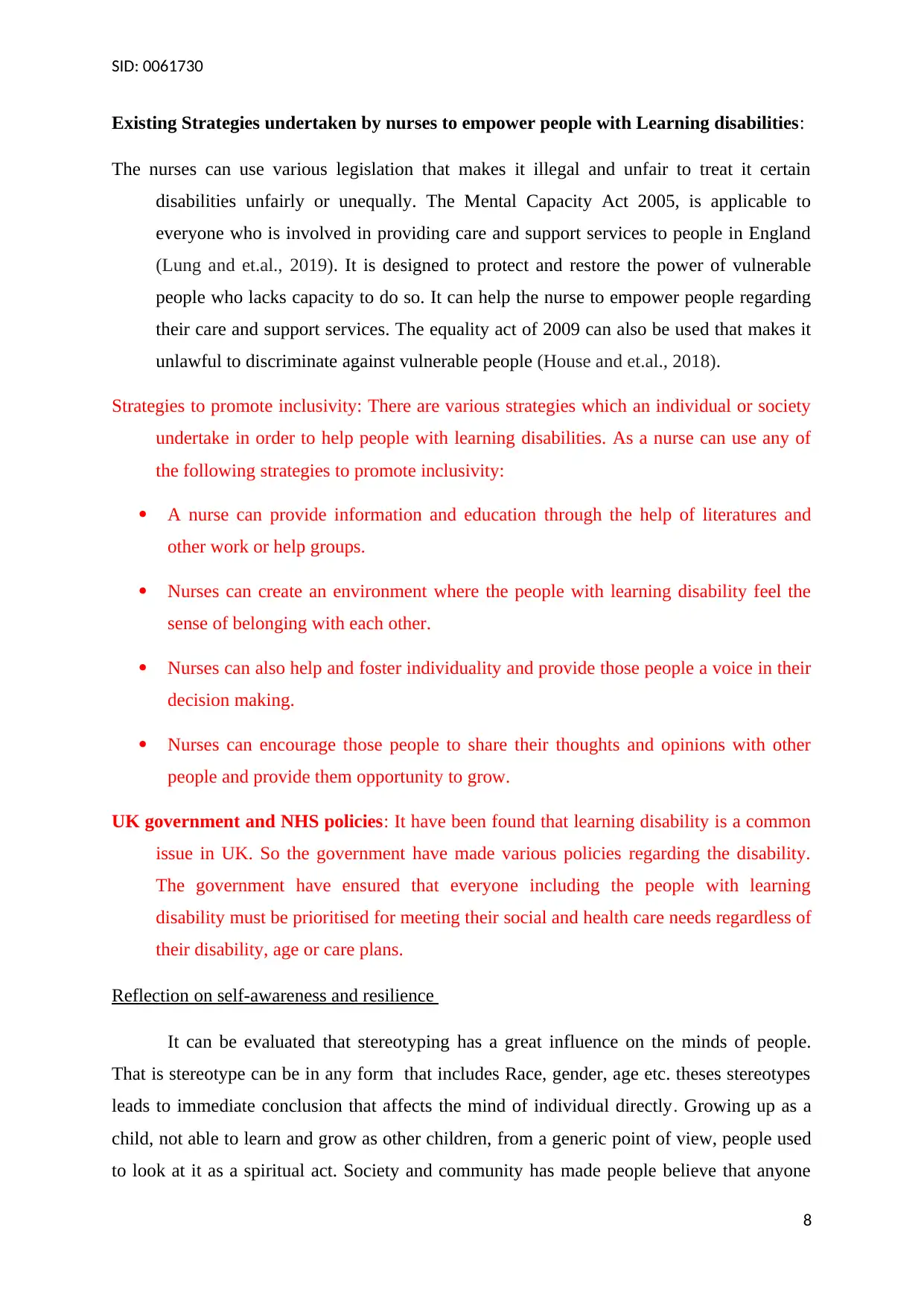
SID: 0061730
Existing Strategies undertaken by nurses to empower people with Learning disabilities:
The nurses can use various legislation that makes it illegal and unfair to treat it certain
disabilities unfairly or unequally. The Mental Capacity Act 2005, is applicable to
everyone who is involved in providing care and support services to people in England
(Lung and et.al., 2019). It is designed to protect and restore the power of vulnerable
people who lacks capacity to do so. It can help the nurse to empower people regarding
their care and support services. The equality act of 2009 can also be used that makes it
unlawful to discriminate against vulnerable people (House and et.al., 2018).
Strategies to promote inclusivity: There are various strategies which an individual or society
undertake in order to help people with learning disabilities. As a nurse can use any of
the following strategies to promote inclusivity:
A nurse can provide information and education through the help of literatures and
other work or help groups.
Nurses can create an environment where the people with learning disability feel the
sense of belonging with each other.
Nurses can also help and foster individuality and provide those people a voice in their
decision making.
Nurses can encourage those people to share their thoughts and opinions with other
people and provide them opportunity to grow.
UK government and NHS policies: It have been found that learning disability is a common
issue in UK. So the government have made various policies regarding the disability.
The government have ensured that everyone including the people with learning
disability must be prioritised for meeting their social and health care needs regardless of
their disability, age or care plans.
Reflection on self-awareness and resilience
It can be evaluated that stereotyping has a great influence on the minds of people.
That is stereotype can be in any form that includes Race, gender, age etc. theses stereotypes
leads to immediate conclusion that affects the mind of individual directly. Growing up as a
child, not able to learn and grow as other children, from a generic point of view, people used
to look at it as a spiritual act. Society and community has made people believe that anyone
8
Existing Strategies undertaken by nurses to empower people with Learning disabilities:
The nurses can use various legislation that makes it illegal and unfair to treat it certain
disabilities unfairly or unequally. The Mental Capacity Act 2005, is applicable to
everyone who is involved in providing care and support services to people in England
(Lung and et.al., 2019). It is designed to protect and restore the power of vulnerable
people who lacks capacity to do so. It can help the nurse to empower people regarding
their care and support services. The equality act of 2009 can also be used that makes it
unlawful to discriminate against vulnerable people (House and et.al., 2018).
Strategies to promote inclusivity: There are various strategies which an individual or society
undertake in order to help people with learning disabilities. As a nurse can use any of
the following strategies to promote inclusivity:
A nurse can provide information and education through the help of literatures and
other work or help groups.
Nurses can create an environment where the people with learning disability feel the
sense of belonging with each other.
Nurses can also help and foster individuality and provide those people a voice in their
decision making.
Nurses can encourage those people to share their thoughts and opinions with other
people and provide them opportunity to grow.
UK government and NHS policies: It have been found that learning disability is a common
issue in UK. So the government have made various policies regarding the disability.
The government have ensured that everyone including the people with learning
disability must be prioritised for meeting their social and health care needs regardless of
their disability, age or care plans.
Reflection on self-awareness and resilience
It can be evaluated that stereotyping has a great influence on the minds of people.
That is stereotype can be in any form that includes Race, gender, age etc. theses stereotypes
leads to immediate conclusion that affects the mind of individual directly. Growing up as a
child, not able to learn and grow as other children, from a generic point of view, people used
to look at it as a spiritual act. Society and community has made people believe that anyone
8
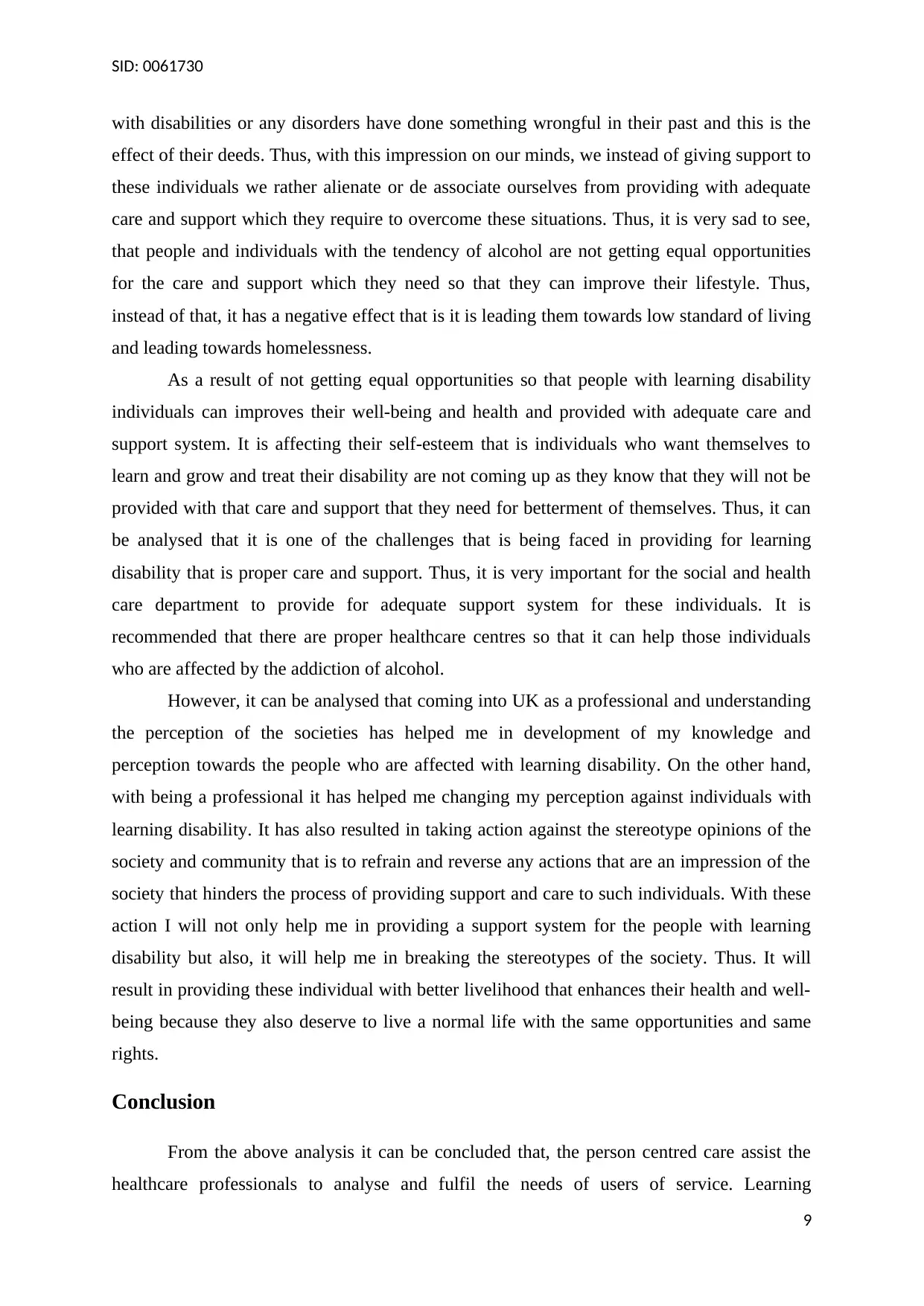
SID: 0061730
with disabilities or any disorders have done something wrongful in their past and this is the
effect of their deeds. Thus, with this impression on our minds, we instead of giving support to
these individuals we rather alienate or de associate ourselves from providing with adequate
care and support which they require to overcome these situations. Thus, it is very sad to see,
that people and individuals with the tendency of alcohol are not getting equal opportunities
for the care and support which they need so that they can improve their lifestyle. Thus,
instead of that, it has a negative effect that is it is leading them towards low standard of living
and leading towards homelessness.
As a result of not getting equal opportunities so that people with learning disability
individuals can improves their well-being and health and provided with adequate care and
support system. It is affecting their self-esteem that is individuals who want themselves to
learn and grow and treat their disability are not coming up as they know that they will not be
provided with that care and support that they need for betterment of themselves. Thus, it can
be analysed that it is one of the challenges that is being faced in providing for learning
disability that is proper care and support. Thus, it is very important for the social and health
care department to provide for adequate support system for these individuals. It is
recommended that there are proper healthcare centres so that it can help those individuals
who are affected by the addiction of alcohol.
However, it can be analysed that coming into UK as a professional and understanding
the perception of the societies has helped me in development of my knowledge and
perception towards the people who are affected with learning disability. On the other hand,
with being a professional it has helped me changing my perception against individuals with
learning disability. It has also resulted in taking action against the stereotype opinions of the
society and community that is to refrain and reverse any actions that are an impression of the
society that hinders the process of providing support and care to such individuals. With these
action I will not only help me in providing a support system for the people with learning
disability but also, it will help me in breaking the stereotypes of the society. Thus. It will
result in providing these individual with better livelihood that enhances their health and well-
being because they also deserve to live a normal life with the same opportunities and same
rights.
Conclusion
From the above analysis it can be concluded that, the person centred care assist the
healthcare professionals to analyse and fulfil the needs of users of service. Learning
9
with disabilities or any disorders have done something wrongful in their past and this is the
effect of their deeds. Thus, with this impression on our minds, we instead of giving support to
these individuals we rather alienate or de associate ourselves from providing with adequate
care and support which they require to overcome these situations. Thus, it is very sad to see,
that people and individuals with the tendency of alcohol are not getting equal opportunities
for the care and support which they need so that they can improve their lifestyle. Thus,
instead of that, it has a negative effect that is it is leading them towards low standard of living
and leading towards homelessness.
As a result of not getting equal opportunities so that people with learning disability
individuals can improves their well-being and health and provided with adequate care and
support system. It is affecting their self-esteem that is individuals who want themselves to
learn and grow and treat their disability are not coming up as they know that they will not be
provided with that care and support that they need for betterment of themselves. Thus, it can
be analysed that it is one of the challenges that is being faced in providing for learning
disability that is proper care and support. Thus, it is very important for the social and health
care department to provide for adequate support system for these individuals. It is
recommended that there are proper healthcare centres so that it can help those individuals
who are affected by the addiction of alcohol.
However, it can be analysed that coming into UK as a professional and understanding
the perception of the societies has helped me in development of my knowledge and
perception towards the people who are affected with learning disability. On the other hand,
with being a professional it has helped me changing my perception against individuals with
learning disability. It has also resulted in taking action against the stereotype opinions of the
society and community that is to refrain and reverse any actions that are an impression of the
society that hinders the process of providing support and care to such individuals. With these
action I will not only help me in providing a support system for the people with learning
disability but also, it will help me in breaking the stereotypes of the society. Thus. It will
result in providing these individual with better livelihood that enhances their health and well-
being because they also deserve to live a normal life with the same opportunities and same
rights.
Conclusion
From the above analysis it can be concluded that, the person centred care assist the
healthcare professionals to analyse and fulfil the needs of users of service. Learning
9
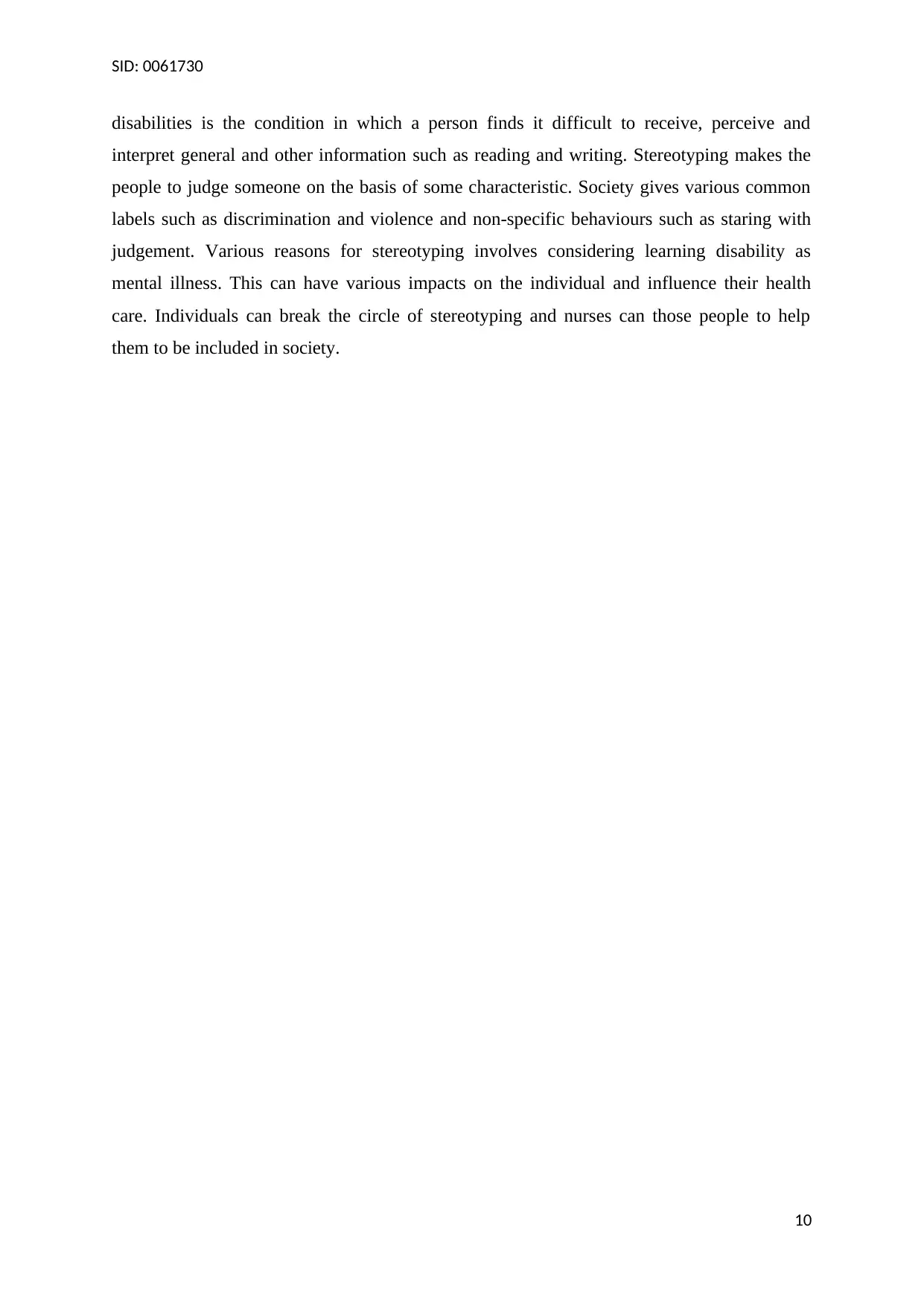
SID: 0061730
disabilities is the condition in which a person finds it difficult to receive, perceive and
interpret general and other information such as reading and writing. Stereotyping makes the
people to judge someone on the basis of some characteristic. Society gives various common
labels such as discrimination and violence and non-specific behaviours such as staring with
judgement. Various reasons for stereotyping involves considering learning disability as
mental illness. This can have various impacts on the individual and influence their health
care. Individuals can break the circle of stereotyping and nurses can those people to help
them to be included in society.
10
disabilities is the condition in which a person finds it difficult to receive, perceive and
interpret general and other information such as reading and writing. Stereotyping makes the
people to judge someone on the basis of some characteristic. Society gives various common
labels such as discrimination and violence and non-specific behaviours such as staring with
judgement. Various reasons for stereotyping involves considering learning disability as
mental illness. This can have various impacts on the individual and influence their health
care. Individuals can break the circle of stereotyping and nurses can those people to help
them to be included in society.
10
Secure Best Marks with AI Grader
Need help grading? Try our AI Grader for instant feedback on your assignments.
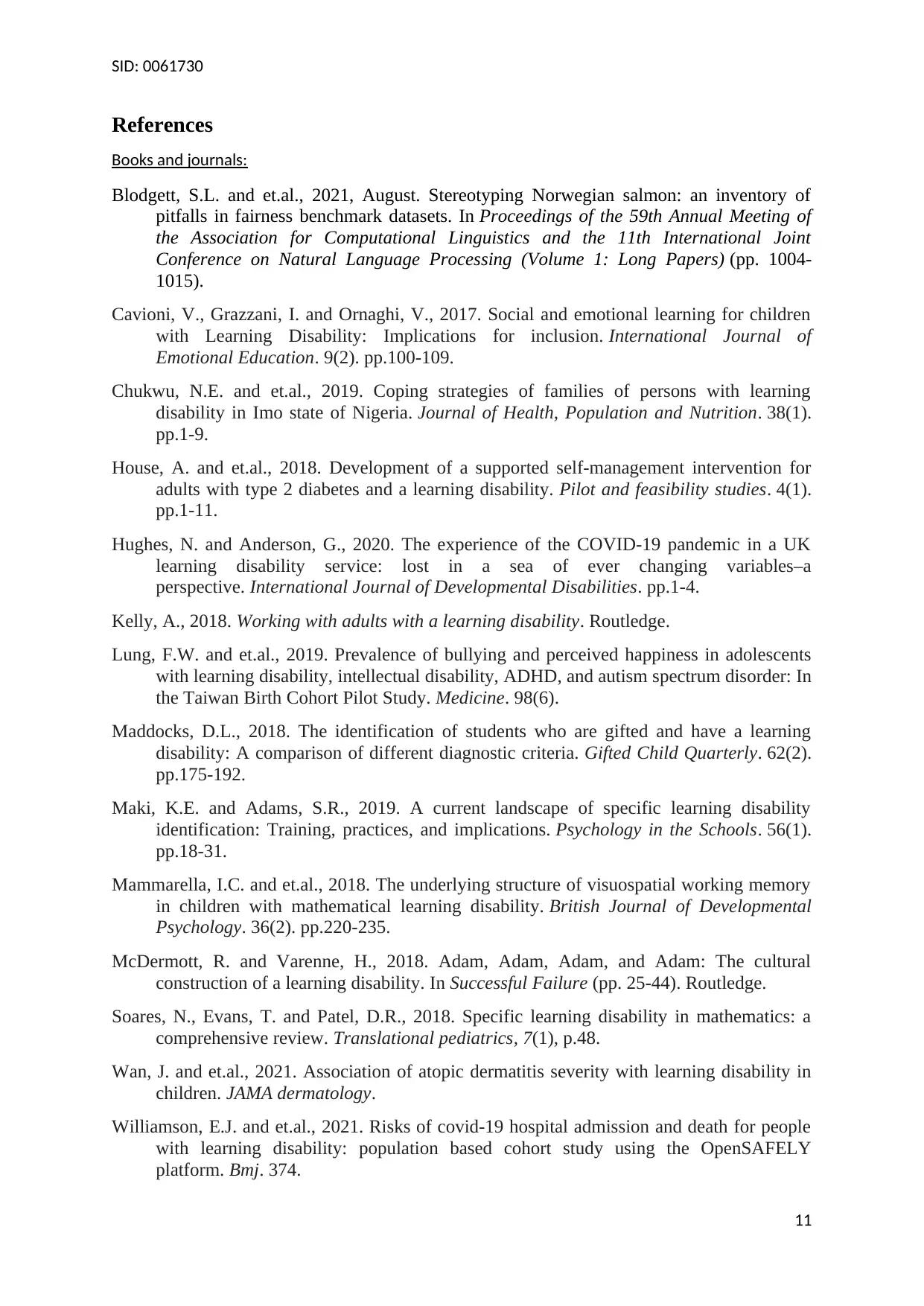
SID: 0061730
References
Books and journals:
Blodgett, S.L. and et.al., 2021, August. Stereotyping Norwegian salmon: an inventory of
pitfalls in fairness benchmark datasets. In Proceedings of the 59th Annual Meeting of
the Association for Computational Linguistics and the 11th International Joint
Conference on Natural Language Processing (Volume 1: Long Papers) (pp. 1004-
1015).
Cavioni, V., Grazzani, I. and Ornaghi, V., 2017. Social and emotional learning for children
with Learning Disability: Implications for inclusion. International Journal of
Emotional Education. 9(2). pp.100-109.
Chukwu, N.E. and et.al., 2019. Coping strategies of families of persons with learning
disability in Imo state of Nigeria. Journal of Health, Population and Nutrition. 38(1).
pp.1-9.
House, A. and et.al., 2018. Development of a supported self-management intervention for
adults with type 2 diabetes and a learning disability. Pilot and feasibility studies. 4(1).
pp.1-11.
Hughes, N. and Anderson, G., 2020. The experience of the COVID-19 pandemic in a UK
learning disability service: lost in a sea of ever changing variables–a
perspective. International Journal of Developmental Disabilities. pp.1-4.
Kelly, A., 2018. Working with adults with a learning disability. Routledge.
Lung, F.W. and et.al., 2019. Prevalence of bullying and perceived happiness in adolescents
with learning disability, intellectual disability, ADHD, and autism spectrum disorder: In
the Taiwan Birth Cohort Pilot Study. Medicine. 98(6).
Maddocks, D.L., 2018. The identification of students who are gifted and have a learning
disability: A comparison of different diagnostic criteria. Gifted Child Quarterly. 62(2).
pp.175-192.
Maki, K.E. and Adams, S.R., 2019. A current landscape of specific learning disability
identification: Training, practices, and implications. Psychology in the Schools. 56(1).
pp.18-31.
Mammarella, I.C. and et.al., 2018. The underlying structure of visuospatial working memory
in children with mathematical learning disability. British Journal of Developmental
Psychology. 36(2). pp.220-235.
McDermott, R. and Varenne, H., 2018. Adam, Adam, Adam, and Adam: The cultural
construction of a learning disability. In Successful Failure (pp. 25-44). Routledge.
Soares, N., Evans, T. and Patel, D.R., 2018. Specific learning disability in mathematics: a
comprehensive review. Translational pediatrics, 7(1), p.48.
Wan, J. and et.al., 2021. Association of atopic dermatitis severity with learning disability in
children. JAMA dermatology.
Williamson, E.J. and et.al., 2021. Risks of covid-19 hospital admission and death for people
with learning disability: population based cohort study using the OpenSAFELY
platform. Bmj. 374.
11
References
Books and journals:
Blodgett, S.L. and et.al., 2021, August. Stereotyping Norwegian salmon: an inventory of
pitfalls in fairness benchmark datasets. In Proceedings of the 59th Annual Meeting of
the Association for Computational Linguistics and the 11th International Joint
Conference on Natural Language Processing (Volume 1: Long Papers) (pp. 1004-
1015).
Cavioni, V., Grazzani, I. and Ornaghi, V., 2017. Social and emotional learning for children
with Learning Disability: Implications for inclusion. International Journal of
Emotional Education. 9(2). pp.100-109.
Chukwu, N.E. and et.al., 2019. Coping strategies of families of persons with learning
disability in Imo state of Nigeria. Journal of Health, Population and Nutrition. 38(1).
pp.1-9.
House, A. and et.al., 2018. Development of a supported self-management intervention for
adults with type 2 diabetes and a learning disability. Pilot and feasibility studies. 4(1).
pp.1-11.
Hughes, N. and Anderson, G., 2020. The experience of the COVID-19 pandemic in a UK
learning disability service: lost in a sea of ever changing variables–a
perspective. International Journal of Developmental Disabilities. pp.1-4.
Kelly, A., 2018. Working with adults with a learning disability. Routledge.
Lung, F.W. and et.al., 2019. Prevalence of bullying and perceived happiness in adolescents
with learning disability, intellectual disability, ADHD, and autism spectrum disorder: In
the Taiwan Birth Cohort Pilot Study. Medicine. 98(6).
Maddocks, D.L., 2018. The identification of students who are gifted and have a learning
disability: A comparison of different diagnostic criteria. Gifted Child Quarterly. 62(2).
pp.175-192.
Maki, K.E. and Adams, S.R., 2019. A current landscape of specific learning disability
identification: Training, practices, and implications. Psychology in the Schools. 56(1).
pp.18-31.
Mammarella, I.C. and et.al., 2018. The underlying structure of visuospatial working memory
in children with mathematical learning disability. British Journal of Developmental
Psychology. 36(2). pp.220-235.
McDermott, R. and Varenne, H., 2018. Adam, Adam, Adam, and Adam: The cultural
construction of a learning disability. In Successful Failure (pp. 25-44). Routledge.
Soares, N., Evans, T. and Patel, D.R., 2018. Specific learning disability in mathematics: a
comprehensive review. Translational pediatrics, 7(1), p.48.
Wan, J. and et.al., 2021. Association of atopic dermatitis severity with learning disability in
children. JAMA dermatology.
Williamson, E.J. and et.al., 2021. Risks of covid-19 hospital admission and death for people
with learning disability: population based cohort study using the OpenSAFELY
platform. Bmj. 374.
11

SID: 0061730
12
12
1 out of 12
Related Documents
Your All-in-One AI-Powered Toolkit for Academic Success.
+13062052269
info@desklib.com
Available 24*7 on WhatsApp / Email
![[object Object]](/_next/static/media/star-bottom.7253800d.svg)
Unlock your academic potential
© 2024 | Zucol Services PVT LTD | All rights reserved.




